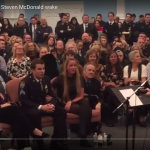 The following is the text of the Christopher News Note “Serving the Poor.” If you’d like a pdf or hard copy, see the end of this post:
The following is the text of the Christopher News Note “Serving the Poor.” If you’d like a pdf or hard copy, see the end of this post:
Whether they are showcasing food, drink or fashion, many advertisements today send a similar message: More! Drink more beer, eat more chips, or wear better clothes and you will be happier. Too often, we are told that our goals in life should be aimed at accumulating wealth, power or popularity. Pope Francis, however, has been promoting a different story.
“In a world where there is so much wealth, so many resources to feed everyone, it is unfathomable that there are so many hungry children, that there are so many children without an education, so many poor persons,” he told a crowd of schoolchildren from Italy and Albania. “Poverty today is a cry. We all have to think if we can become a little poorer, all of us have to do this. How can I become a little poorer in order to be more like Jesus, who was the poor Teacher?”
Serving the poor allows us to move outside of ourselves and to consider our neighbors first. The book of Isaiah reads, “If you lavish your food on the hungry and satisfy the afflicted; Then your light shall rise in the darkness, and your gloom shall become like midday. Then the LORD will guide you always and satisfy your thirst in parched places, will give strength to your bones; And you shall be like a watered garden,
like a flowing spring whose waters never fail.”
In other words, we must think of the needs of others first. For in doing so, we bring light to our own lives, as well. Christ urged His followers to feed the hungry, give drink to the thirsty, and visit the imprisoned, among other acts of mercy, saying, “Whatever you did for one of these least brothers of Mine, you did for Me.”
Each of us is called to serve the poor in the best ways we can, and sometimes this means challenging ourselves to move beyond our comfort zones. Yet how, exactly, does one go about serving the poor in real, meaningful ways?
Dispelling Fear and Misconceptions
Today Catherine Kirwan-Avila works as a service coordinator at Pathways to Housing, an organization serving chronically homeless people with mental illness in Philadelphia, Pennsylvania. There she interacts with individuals who, not too long ago, she might have passed by on the street without a second glance. “I realized I had been seeing them as not quite fully human,” she said. “I realized that was not a good thing, and the only way that was going to be broken down was to get to know people better.” She chose her current job in part as a way to dispel some of the fears and misconceptions she held about the homeless. “I knew I had some work to do to see these individuals as brothers and sisters,” she said.
Today she works to strike a balance between professional distance and Christ-like compassion. She strives to listen to her clients and to understand their stories: “It’s at those moments when you meet someone where they are and you get to know them that you see them as another person.”
Recently, Kirwan-Avila went to a store with a client. The man behind the counter asked if the client was her father. She replied: “No, a friend.” But at that moment she realized: He could be. Her client’s struggles could just as easily have been her father’s or a friend’s. Now, Kirwan-Avila strives to look at the men and women she serves in the way she imagines God looks at them. “That’s why we pray,” she says. “We have to cultivate that.”
The Things We Throw Away
While living in Kenya, James Martin, S.J., helped to throw a Christmas party for the refugees he served. Each person in attendance received three green, plastic cups. A few weeks later, Father Martin was visiting one of the refugees who had attended the party. She lived in an unlit shack. When Father Martin entered he noticed she had set the cups on a small, wooden table and given them pride of place. “Brother Jim, I love my cups,” she told him.
“For me a plastic cup was something you might throw away,” Father Martin said. “But her words have stuck with me.” Witnessing the gratitude felt by those who had very few possessions reminded Father Martin to be more grateful for the many blessings in his own life.
He said that words often attributed to St. Basil the Great come to mind when he considers how to serve the poor: “The bread which you do not use is the bread of the hungry; the garment hanging in your wardrobe is the garment of him who is naked; the shoes that you do not wear are the shoes of the one who is barefoot; the money that you keep locked away is the money of the poor; the acts of charity that you do not perform are so many injustices that you commit.”
Father Martin also said that, while solutions to poverty can seem complicated, sometimes the issue is quite clear: “They do not have and we have, and it’s up to us to help them.”
Pope Francis has offered a similar reminder that we must work for change not just on a global level but also on an individual level. In doing so we touch the wounds of Christ.
What You Do With What You Have
On holidays, Father Paul Lostritto, O.F.M., tries to make the meals at the St. Francis Breadline in New York special, perhaps adding a piece of cake or a new type of juice to the hundreds of bags handed out exactly at 7:00 a.m. each morning, seven days a week. The breadline began in 1930 to help those in need during the Depression. Today, volunteers hand out plastic bags containing sandwiches to the dozens of people in need of a meal.
“For many of the older volunteers, the breadline is a real place to come and feel welcome and to stay active,” said Father Lostritto, who coordinates several outreach ministries at the parish. “For the younger volunteers it’s an eye opener. Many don’t realize that their next door neighbors might be people who are in dire need of help.”
For some volunteers, the experience sparks an interest in becoming more involved with the parish itself. For instance, some breadline volunteers have become Eucharistic ministers. “That’s church to me,” Father Lostritto said. “It’s not just sitting in the church itself. It’s what you do with what you have in the community.”
St. Francis also provides a grocery delivery program for the elderly and homebound. The deliveries build community, both among the volunteers and with the diverse group of people they serve. One woman who received meals from the volunteers said to them, “I was wary of Catholics, but you guys have restored my faith in Catholics and what religious people do.”
Three Serving Thousands
In Cotes-de-Fer, Haiti, one doctor, one nurse and one auxiliary nurse serve thousands upon thousands of people. The Catholic Medical Mission Board (C.M.M.B.)—a faith-based NGO focused exclusively on global health care for the world’s poor—is working to change that. The organization has chosen Cotes-de-Fer as the site of a new, 30-bed, health-care center, which is part of a program called the Children And Mothers Partnerships (or CHAMPS). The center will reach an area of 55,000 Haitians, who currently lack access to quality health care facilities.
The CHAMPS model includes a 15-year commitment to build healthy, sustainable communities in geographic areas of focus. C.M.M.B. will work in partnership with an existing in-region health system and focus on mothers and children under five years of age. CHAMPS sites are being planned for Peru, Kenya and Zambia.
“We believe strongly that healthcare should be a basic human right,” said Barbara Wright, director of communications for the C.M.M.B. “It’s part of the healing ministry of Christ. Christ cared for those less able to care for themselves and we see this as carrying out His mission in a way. We are into values that are graced by the church, building individual capacity and social justice and integrity and compassion.”
Hands Together
In 1986, Father Tom Hagan, the Catholic Chaplain at Lafayette College in Easton, Pennsylvania, took a group of students on a mission trip to Haiti to serve the poor there. Doug Campbell was one of those students, and he remembers Father Hagan encouraging him to “strive to see Jesus in every human face.”
Following a positive response to the trip, Father Hagan felt determined to make his dream of compassionate service grow. He founded the nonprofit organization Hands Together with that in mind, and moved to Port-au-Prince in 1997.
Hands Together serves Haiti’s largest and poorest slum, Cite Soleil, having built eight schools to offer children and teens a good education and a daily hot meal. They’ve also established a free medical clinic along with an elderly outreach and housing program. Outside of Port-au-Prince, they assist the rural poor through water well digging, promoting agricultural production, and assisting poor schools and clinics.
Doug Campbell, who now serves as Hands Together’s Executive Director, says, “We recognize that the results of our work are ultimately in God’s hands. This dependence upon God has transformed this small student-based group into a program helping thousands of families in the poorest areas of Haiti.”
Indeed it is these values that Pope Francis has urged Christians to uphold, as members of the Body of Christ. He said, “If investments in banks fall, it is a tragedy and people say, ‘What are we going to do?’ But if people die of hunger, have nothing to eat or suffer from poor health, that’s nothing. This is our crisis today. A Church that is poor and for the poor has to fight this mentality.”
“What we would like to do is change the world–make it a little simpler for people to feed, clothe, and shelter themselves as God intended them to do…We can throw our pebble in the pond and be confident that its ever widening circle will reach around the world.”
– Dorothy Day
To receive a pdf or mailed copy of “Serving the Poor,” email your request to [email protected]











